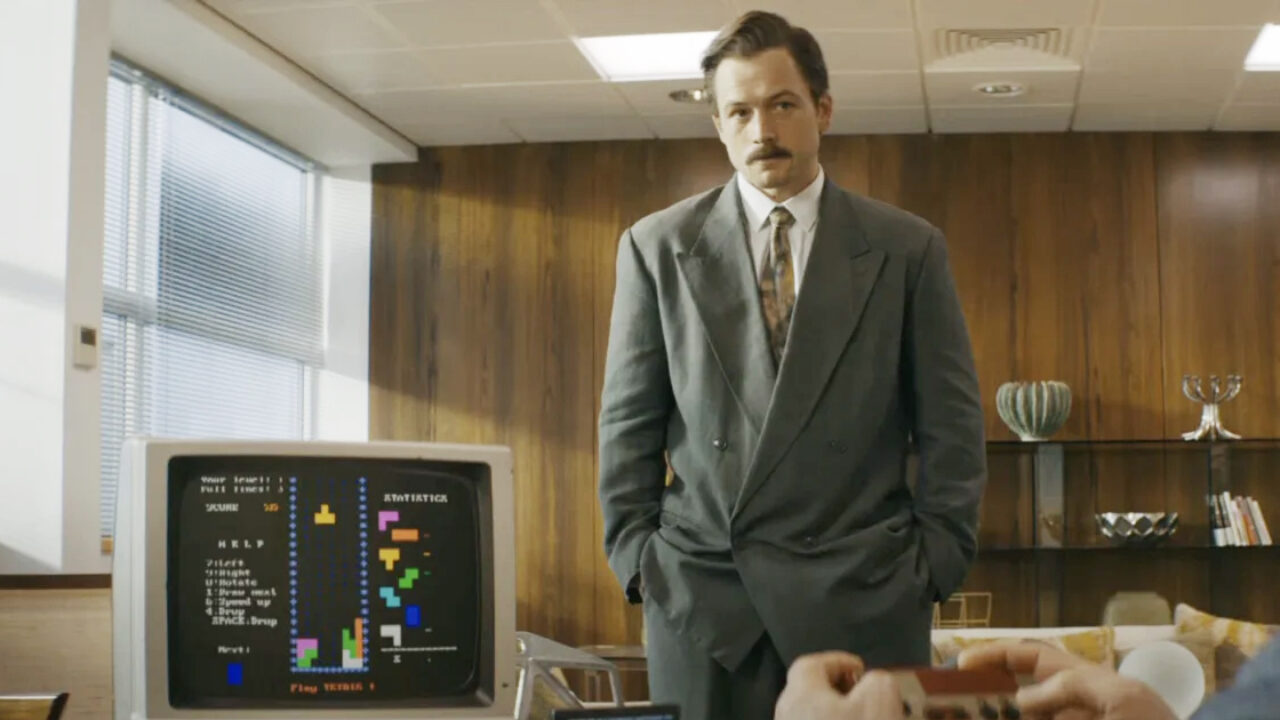Millions have played some version of Tetris, but nobody plays the game for its story. After all, the addictive puzzler has captivated generations of gamers with its neatly easy-to-learn, but tough-to-master, gameplay rather than its total lack of narrative. It’s not The Last of Us.
Yet Tetris does have an incredible story. It’s a tale about how a software designer named Henk Rogers and Tetris creator Alexey Pajitnov helped get the game fully out of the Soviet Union and into the hands of many of those millions of fans via the game’s legendary Game Boy port. You won’t find that story in the games themselves, but you will find it in Tetris: the movie about the game’s real-life history that is now streaming on Apple TV+.
The story of Tetris‘ journey to the Game Boy is a gripping tale of espionage, political intrigue, friendship, and overcoming the odds, the likes of which countless screenwriters spend their whole lives trying to construct. Yet Rogers and Pajitnov never really thought they’d see that part of their lives told in this way.
“We never planned for this story to be a movie,” says Pajitnov in an interview with Den of Geek. “The most we ever planned was to write books or put together some memoirs about that time. When the proposal to make a movie was made, we were very surprised and pleased.”
While the story of Tetris’ origins would have undoubtedly compelled audiences in just about any era, there is something special about that story being told now. At a time when Russia’s invasion of Ukraine has contributed to a level of global political tension that reminds some of the Cold War era, the idea of a Westerner heading into the Soviet Union to find a video game and coming back with a lifelong friend feels wonderfully idealistic. That parallel hasn’t been lost on Rogers and Pajitnov.
“The most relevant part of this story is this friendship made between a Dutch American and a Russian, made while their governments are going nuts,” says Rogers. “I think that friendship transcends the misunderstandings, if you will, between governments. This story proves that right now, in today’s world, we can still be friends even with all the nastiness that is happening.”
Pajitnov, with a smile toward his friend, supports the idea that the story of Tetris is about so much more than the game.
“For me, a big part of the movie was the idea that the future always conquers the past,” Pajitnov recalls. “The evil Soviet Union was really all these bureaucrats, and all these strange businessmen arguing over the future of entertainment and a very good computer game. How the game got through all of that makes for a thrilling movie that feels important and joyful to watch.”
While Tetris was technically available on other platforms prior to its Game Boy debut, it’s no surprise that many still remember it as a Game Boy game. There was a harmonious relationship between that game and that hardware, with Rogers recognizing the potential of that relationship right away.
“People say that Tetris made Game Boy and Game Boy made Tetris, but it was kind of a match made in Heaven” Rogers recalls. “Basically, the Game Boy’s form factor didn’t lend itself to many games that already existed on consoles. For example, if you have a bullet in another game, that bullet is so small and hard to see on a Game Boy. On a Game Boy, though, you can see Tetris pieces perfectly.”
Interestingly, Pajitnov suggests that Tetris may have never worked on the Game Boy at all if he had only been able to expand the game in all the ways he wanted to do so.
“I wished to put more bells and whistles in the game, but I didn’t even have graphics on my computer!” Pajitnov jokes.
Despite the fact that the Tetris games never recreated Rogers and Pajitnov’s story, there is something thematically compelling about the ways that those games have transcended languages, cultures, and generations, just as Rogers and Pajitnov had to overcome similar hurdles in their own journey. Interestingly, Rogers was always remarkably confident that Tetris was powerful enough to break through any barrier.
“Tetris can be played by anybody,” Rogers says. “My sales pitch to [Nintendo founder and former President] Minoru Arakawa was ‘If you want little boys to buy a Game Boy, include a Mario game. If you want everyone to buy a Game Boy, include Tetris.’ He bought that story [Laughs].”
Since then, over 500 million copies of various editions of Tetris have also been bought and endlessly played by gamers who live with not just their memories of the game but an incredible sensation that makes them see the game whenever they close their eyes. It’s called the “Tetris Effect,” and after decades spent with the game, Rogers and Pajitnov “suffer” from it as well.
“I still see Tetris blocks in everyday stuff,” Rogers says. “If I’m walking around and I see a Tetris block in something, I’ll always take a picture. I have a whole collection of things in my travels that look like Tetris blocks.” He pauses to look at Alexy before laughing, “it’s kind of annoying, actually!”
Tetris is streaming on Apple TV+ now.
